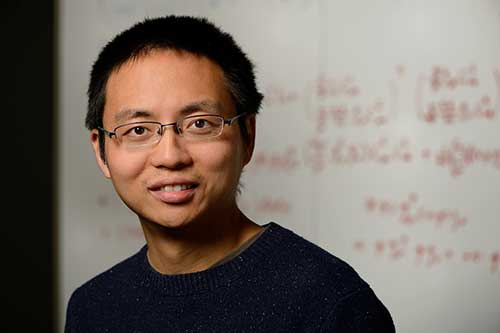Research Spotlight:
professor lan cheng

Meet Professor Lan Cheng
Professor Lan Cheng is an Associate Professor in theoretical and computational chemistry. He received his Ph.D. in Theoretical Chemistry from Peking University. Dr. Chen later worked as a postdoctoral fellow at Johannes-Gutenberg Universität Mainz and at the University of Texas at Austin. His research group, Cheng Lab, focuses on relativistic electron-structure theory and heavy-element chemistry.
Q: What is the focus of your research?
LC: Our research focuses on computational chemistry. We use computation to solve mathematical and physical equations that cover the motion of electrons in atoms and molecules. Computation is an important part of our studies because these equations are too complex to be solved by hand, so with the help of computers we can solve these equations and get calculations that are more accurate for larger systems and of general interest to chemistry, physics, and any field related to molecular science.
Q: What inspired you to pursue a career in this field?
LC: Like many researchers, I always found research to be very interesting. With research, you get a chance to work on topics that one is interested in. You may not know everything about the topic so every day you get to acquire new knowledge, which is very satisfying. I was fortunate enough to be able to complete research as a grad student and later post doc, and now I can do research with the Cheng Lab group which I’m very thankful for.
Q: What is the impact or value of Rockfish on your research?
LC: Rockfish is a perfect example of how computation can help groups like us with our study. The resources of Rockfish on campus make many of our methodologies very convenient. Not only do we run calculations, but we develop program packages which have specific requirements. Rockfish is always very responsive and flexible to these requests, and they make sure they can provide us with the resources to make sure we can keep our research going.
Q: How important to you is it use Rockfish resources for teaching?
LC: At the graduate and senior undergraduate level, teaching has a focus on research. Rockfish’s ability to provide students with resources from a standard high performance computing facility in computation chemistry courses is very beneficial. Students get firsthand experience using HPC facilities that can later be used when they want to do calculations for their own research. I really appreciate working together with Rockfish to provide students with the skills necessary to be successful in their future with research.
Q: What other resources would you like Rockfish and ARCH to provide?
LC: I do not have any specific resource I would like them to provide, but I would like to keep working closely together with the Rockfish team. Since we are in constant touch, I often provide them with ideas that would be useful for teaching and research. It is significant to communicate with each other so we are both aware of our priorities and can fully understand each other to keep doing our own work efficiently. For molecular scientists, it is important to have a very stable and working system, and we may have specific requirements that can be figured out by communication. Therefore, I would like to keep in constant contact with the Rockfish team.
